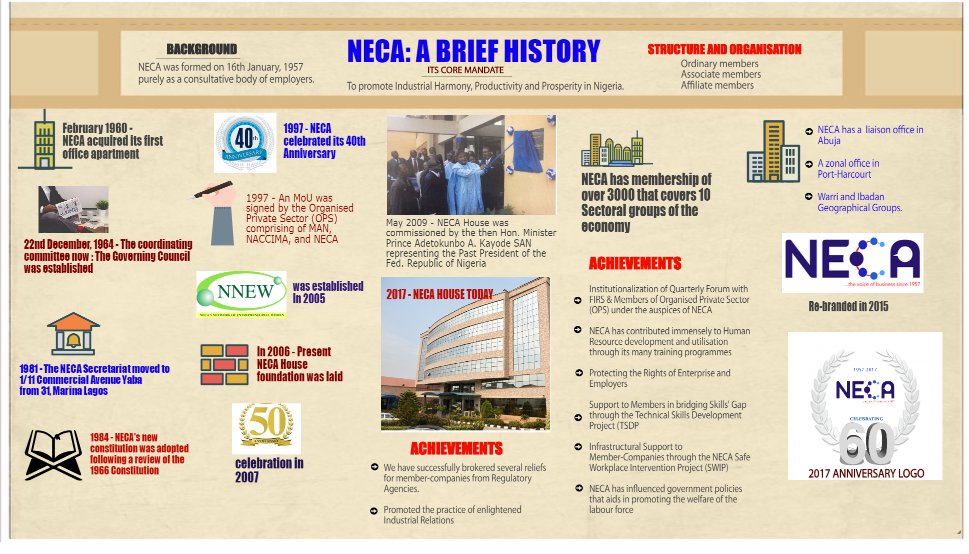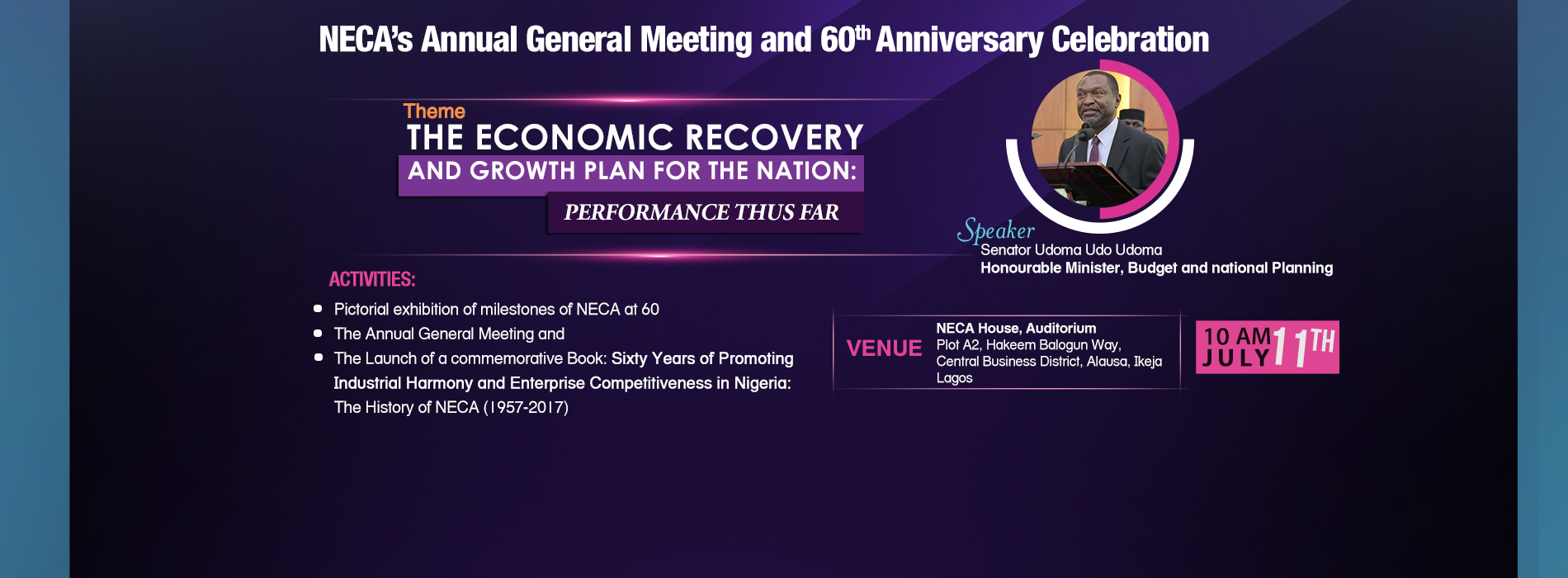BUSINESS ESSENTIAL VOL 4. VOL 13.
Dear Esteemed Member,
Further to our advocacy campaign, NECA had drawn the attention of Federal Inland Revenue Service (FIRS) to the illegality being perpetrated through the enforcement of Stamp Duties Act by NIPOST and the Banks. In this edition, we highlighted the self explanatory and detailed response from the Executive Chairman, FIRS on the implementation of the Stamp Duties Acts for your information.
In promoting robust industrial relations within our organisations, we shared an important tool in engaging employees for high retention level and enhancement of productivity, the issue of “Joint Consultation”.
Our regular Labour and Employment Law Review and Upcoming Training Programmes were not left out.
Have a pleasant reading.
Timothy Olawale
Editor
In this Issue:
- Recent Development On The Implementation Of The Stamp Duties Act
- Joint Consultation as a Machinery for Motivation
- Press Release: Review Of The National Minimum Wage: NECA Urges Caution By Stakeholders
- Labour & Employment Law: Collective Agreement (Ganiu Lawal & 3 others vs. Federated Steel Mills Limited) (2014) 42 N.L.L.R. Pt 130, P. 306 NIC
- Upcoming Training Programmes

Keep the Conversation Focused in Your Next Meeting You’ve seen it happen in a meeting before: One person expresses an opinion, two others respond to that comment, someone else subtly segues to another topic, and everyone starts weighing in on that new issue. Even if it’s all related to the agenda, a team loses momentum when people start down multiple conversational tracks without reaching a conclusion. Stay focused with this simple rule: If you raise it, you land it. When you bring up an issue or ask a question, take responsibility for making sure that the issue is resolved before the team shifts to something else. That often means hearing from everyone in the meeting, even if only to find out whether they agree with what you’re proposing. For example, if you say, “Given our discussion, I think we shouldn’t adjust our plan until we see the financials from the first quarter,” follow it by asking, “Is there anyone who has any concerns about doing that?” Adapted from “5 Ways Meetings Get Off Track, and How to Prevent Each One,” by Roger Schwarz |
RECENT DEVELOPMENT ON THE IMPLEMENTATION OF THE STAMP DUTIES ACT
Recently, we received correspondence from the office of the Executive Chairman of the Federal Inland Revenue Service (FIRS) on the above subject giving clarity on the implementation of the Act and the role/power of FIRS and NIPOST. Please, find as follows for your enlightenment:
Issue 1: Whether NIPOST is empowered to administer the Stamp Duties Act? FIRS stated that “there is no specific section of the Stamp Duties Act that empowers NIPOST to administer Stamp Duties. However, Section 4 of the Taxes and Levies (Approved List of Collection) Act states FIRS as the statutory tax authority for the administration and collection of Federal Government taxes stated therein”.
Issue 2: Whether affixing N50 postage Stamp is mandatory? The Executive Chairman, FIRS affirmed that “there is no specific section of Stamp Duties Act that made it mandatory to affix N50 postage stamp”. Citing Section 4(1) of Stamp Duties Act (Cap 58) LFN 2004 as updated to 2007, which specified that “the Federal Government shall be the only competent authority to impose, charge and collect duties upon instruments specified in the Schedule to this Act, if such instrument relates to matters executed between a company and individual, group or body of individuals”. However, Section 5(2) of Stamp Duties Act (Cap 58) LFN 2004 as updated to 2007 specified that “ where the duty may be denoted by adhesive stamps, postage stamps may, subject to the provisions of any Act or regulation, be used for the purpose”.
Issue 3: Whether N50 postage stamp was specified and/or mentioned in the Act? Mr. Tunde Fowler informed that “there is no specific mention of affixing a N50 postage stamp in the Stamp Duties Act on any instrument. The provision of the Section 4(1) and 5(2) of Stamp Duties Act (CAP 58) LFN 2004 as updated to 2007 cited above is a provision in the Act for the postage stamp. The amount on the postage stamp can however be specified by a regulation”.
Issue 4: The applicability of stamp duty to transactions outside real estate and related business transactions? The Revenue Service boss informed that “stamp duty is not limited to any sector or transaction. Stamp duty is a tax levied on documents to give it a legal recognition in case of default. However, the schedule to the Stamp Duty Act outlines the transaction applicable to Stamp Duty and those exempted”.
Most Recent Ruling of the Courts on the Matter:
There had been several rulings of the Federal and States High Courts invalidating the unwholesome implementation of the Stamp Duty Act. In fact the Federal Court of Appeal had also delivered judgement along the same line.
Worthy of note is the most recent Federal High Court (FHC) judgment on the non-validity of the circular issued by Central Bank of Nigeria (CBN) referenced CBN/GEN/DMB/02/006, in the case between Retail Supermarkets Nigeria Limited (Shoprite) and the defendants Citibank Nigeria Limited (Citibank) and Central Bank of Nigeria (CBN).
The issue: determining if the CBN circular aligns with the provisions of the Stamp Duties Act (SDA).
Background of the case
- CBN issued a circular on 15th January 2016, mandating all banks and other financial institutions to enforce collection of ₦50 stamp duty on all electronic transfers and teller deposits from ₦1,000 and above.
- Shoprite, incorporated under the laws of Nigeria, operates a retail business and runs a chain of supermarkets across Nigeria. Further, to the release of the circular, Citibank intimated its customers that it will begin to implement CBN’s directives and subsequently began deducting stamp duties from Shoprite’s account, in line with the CBN circular.
- Dissatisfied, Shoprite initiated a law suit at the FHC, citing huge cost implications due to implementation of the circular, and therefore sought clarification from the court on:
- Whether Citibank could implement the provisions of the CBN circular in respect of deposits into the bank account of Shoprite
- Whether the stamp duty of ₦50 was consistent with the provisions of the SDA
In delivering its judgment, the FHC held that the provisions of the CBN circular are inconsistent with the provisions of the SDA and as such are null and void.
Judicial precedence
In delivering its judgment, the FHC insisted that it was bound by the decision of a higher court, in this case the Court of Appeal (CoA), in a case between Standard Chartered Bank Nigeria Limited and Kasmal International Services Limited & Ors (SCB V KASMAL).
The ruling of the CoA was quite fundamental and instructive. The key highlights of the judgment include:
- The CoA noted that it could only enforce and apply provisions of the law which are in existence and in force in Nigeria.
- Section 89 of the SDA provides the applicable duty to be charged on receipts. Receipts include any note, memorandum, or writing, bill of exchange or promissory note for monies amounting to N4 and above, is acknowledged or expressed to have been received or deposited or paid. The applicable stamp duty rate is 2 kobo.

However, the Schedule to the SDA specifically exempts receipts given for money deposited in any bank from stamp duties.
- In this regard, the CoA held that there was no provision or amendment in the SDA conferring powers upon the banks and other financial institution to deduct and collect stamp duty on deposits or transfers
Highlights of the FHC ruling
In view of the issues submitted for evaluation, the FHC ruled as follows:
- The provisions of the CBN circular are invalid, null and void and have been set aside by order
- Perpetual injunction order restraining Citibank and its agents from implementing the provisions of the CBN circular.
OPINION
- The FHC judgment is a welcome development, as it provides further clarity on the subject. Taxpayers are admonished to seek clarification from the courts where new regulations issued are considered to contradict existing laws.
- The above notwithstanding, inspite of the earlier judgment by the CoA, most banks are yet to discard the provisions of the CBN circular. It will therefore be interesting to see the response from stakeholders going forward.
- The judgement further reinforces that based on the SDA, there is no right to impose and collect the N50 charge.
- Further, bank customers are likely going to seek court injunctions on refund of stamp duties already deducted.
PRESS RELEASE
REVIEW OF THE NATIONAL MINIMUM WAGE: NECA URGES CAUTION BY STAKEHOLDERS
Nigeria Employers’ Consultative Association (NECA) has urged Stakeholders in the Socio-labour community and players in the Nigerian Industrial Relations’ System to be circumspect in their approach to the heated issue on the review of the National Minimum Wage.
Speaking in Lagos, the Director General of……. <Read More>
Joint Consultation as Machinery for Motivation
The term Joint Consultation is usually used to describe the formal machinery in which the managers and the workers in a firm, or their elected and appointed representatives, discuss their common problems, decide about them and exchange information. The agenda of a joint consultative committee will normally exclude topics considered by the trade unions to be matters for the collective bargaining machinery.
In its common expression, the theory of joint consultation comprises a few straight forward propositions about human nature and industrial organisation.
Firstly, it is held that individuals feel better if they are given an opportunity, either directly or indirectly, at the most, to participate in those decisions which affect their jobs and hence their living. At least to be informed of what decisions have been taken and why.
The second hypothesis is that an organisation wishing to keep its employees satisfied should provide a forum where they can voice their minor grievances and canvass ideas for improvement.
Thirdly, while it might be admitted that there are issues and occasions for conflict in industry, there are also many more points of common interest and objective between managers and workers than are explicit in the day-to-day business of getting the job done, and joint consultation helps to provide the means to seek common ground.
Fourthly, there are many matters of administration, of sports clubs, bonus and profit-sharing schemes and the like, where the organizing talents of the ordinary employee can find opportunities denied to him unavoidably in every day work.
Fifthly, it is usually supposed that if the facilities for participation and the forum for discussion are provided, the employees will feel better about working for the fir. The result then will be lower turnover and absence rates, a lower incidence of conflict, a feeling of loyalty and belonging and, in all probability, a greater will to work.
Finally, joint consultation allows managers and workers to meet in circumstances where their relationship of subordinate to superior is played down, and their common role as employees of the firm, equally concerned with its fortunes, is played up. This is good for everyone’s morale.
Joint consultation takes the view that the task of management is not just a technical one. It is a job of creating a social organisation in which everyone feel a sense of close identification. It is for this reason that Management by Objective (MBO) is a doubly attractive doctrine. It accommodates within the same body of management practice the apparently opposing requirements for order, authority, discipline and continuity on the one hand (which emphasizes constraints on the individual), and democracy, participation, consultation on the other (which emphasizes opportunities for the individual). Because of this, management’s authority at all levels is rendered legitimate, and so are the processes of advancement to positions of greater authority.
Source: NECA Archives
LABOUR & EMPLOYMENT LAW: Collective Agreement (Ganiu Lawal & 3 others vs. Federated Steel Mills Limited) (2014) 42 N.L.L.R. Pt 130, P. 306 NIC
Facts:
- The claimants’ complaint was against the right of the defendant to terminate their employment in furtherance to a collective agreement which was reached between the Association of Metal Products, Iron and Steel Employers of Nigeria (AMPISEN) and Steel and Engineering Workers’ Union of Nigeria (SEWUN).
- The position of the defendant was that because the claimants were accredited members of SEWUN and they paid their dues regularly to the Union; they are bound by the terms and conditions in the collective agreement.
Issues
- Whether or not the Collective Agreement between Association of Metal Products, Iron and Steel Employers of Nigeria (AMPISEN) and Steel and Engineering Workers’ Union of Nigeria (SEWUN) was enforceable on the claimants; thereby making the termination of the claimants’ employment by the defendant proper.
The Judgement
On jurisdiction of the National Industrial Court over interpretation and application of Collective Agreement:-
By the provisions of section 254C of the Constitution of the Federal Republic of Nigeria 1999 as amended by third Alteration Act 2010, the National Industrial Court has exclusive jurisdiction in civil causes and matters relating to the determination of any question as to the interpretation and application of any Collective Agreement.
On definition of Collective Agreement:-
Section 54 of the National Industrial Court Act 2006 defines Collective Agreement as: any agreement in writing regarding working conditions and terms of employment concluded between:
- An organisation of employers or an organisation and representing employers (or an association of such organisations) on the one part, and
- An organisation of employees or an organisation and representing employees (or an association of such organisations) on the other part.
From the above provisions, therefore, the Court has unfettered jurisdiction to interpret the Collective Agreement between AMPISEN and SEWUN.
In the instant case, the claimants being members of SEWUN were covered by the Collective Agreement entered into by SEWUN with AMPISEN. Thus, the Collective Agreement is applicable to the claimants. See: ASCSN vs. Ho. Minister of Works & Ors (2011) 22 NLLR pt. 63, p 493
Final Judgment:-
The Judge held the Collective Agreement between AMPISEN and SEWUN was binding on the claimants; consequently their compulsory retirement was proper. The claimants’ suit was, accordingly, dismissed.
OPINION:
Parties are bound by their agreement and what has been done by agreement can only be undone by another agreement.

Planning for Golden Years in Retirement: Connecting To a Qualitative Future After Work Life
Date: 10th – 12th May, 2017
Duration: 3 Days
Venue: NECA Learning Centre
Course Fee: N115,500/participant
Exceptional Customer Care & Zero Tolerance For Service Gaps
Date: 24th – 25th May, 2017
Duration: 2 Days
Venue: NECA Learning Centre
Course Fee: N82,500/participant
For further details please contact Adewale (08069720364) adewale@neca.org.ng
Visit www.neca.org.ng







Recent Comments